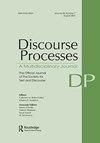“他肯定已经忘记了”:嵌套认知表达的处理
IF 2.1
2区 心理学
Q2 PSYCHOLOGY, EDUCATIONAL
引用次数: 0
摘要
摘要:本文通过三个实验研究嵌套式认知表达的处理,即在一个子句中包含两个认知情态的话语,如“他当然可能已经忘记了”。虽然一些语言学家声称,在嵌套的认知表达中,一个情态在语义上基于词序嵌入到另一个情态的范围内,但在日常对话中,嵌套情态的范围可能没有被彻底处理,导致对两个情态的词序不敏感的“足够好”的解释。本研究采用概率判断测验考察人们对嵌套认知表达的解释,没有观察到语序的影响。这一结果不支持嵌套认知表达式的范围解释,并提出了一种符合“足够好”处理框架的整体处理机制。本文章由计算机程序翻译,如有差异,请以英文原文为准。
“He May Certainly Have Forgotten”: Processing of Nested Epistemic Expressions
ABSTRACT This article presents a series of three experiments investigating the processing of nested epistemic expressions, utterances containing two epistemic modals in one clause, such as “he certainly may have forgotten.” While some linguists claim that in a nested epistemic expression one modal is semantically embedded within the scope of the other modal based on the word order, it is possible that in daily conversation the scope of nested modals may not be thoroughly processed, leading to a “good-enough” interpretation that is not sensitive to the word order of the two modals. This study used probability judgment tests to investigate people’s interpretation of nested epistemic expressions, and the effect of word order was not observed. This result fails to support the scope account of the nested epistemic expressions and suggests a holistic processing mechanism in line with the good-enough processing framework.
求助全文
通过发布文献求助,成功后即可免费获取论文全文。
去求助
来源期刊

Discourse Processes
Multiple-
CiteScore
4.30
自引率
4.50%
发文量
27
期刊介绍:
Discourse Processes is a multidisciplinary journal providing a forum for cross-fertilization of ideas from diverse disciplines sharing a common interest in discourse--prose comprehension and recall, dialogue analysis, text grammar construction, computer simulation of natural language, cross-cultural comparisons of communicative competence, or related topics. The problems posed by multisentence contexts and the methods required to investigate them, although not always unique to discourse, are sufficiently distinct so as to require an organized mode of scientific interaction made possible through the journal.
 求助内容:
求助内容: 应助结果提醒方式:
应助结果提醒方式:


